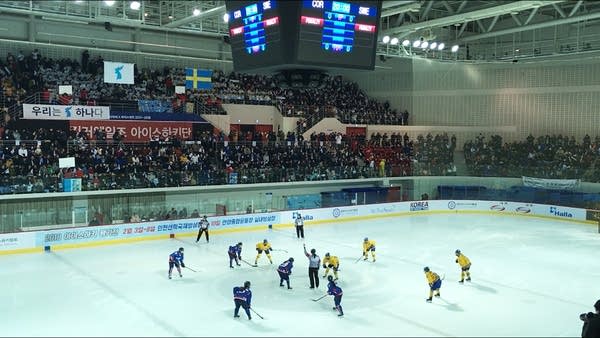Hockey pucks, politics — and the eyes of the world

Go Deeper.
Create an account or log in to save stories.
Like this?
Thanks for liking this story! We have added it to a list of your favorite stories.

A new book explores the extraordinary circumstances, as well as the Minnesota connections, behind the unified Korean women’s ice hockey team at the 2018 Winter Olympics.
Very soon after the IOC awarded South Korea the 2018 games, the Korean Ice Hockey Association realized it faced a desperate shortage of female international caliber players.
So what did they do? Seth Berkman, author of "A Team of Their Own: How an International Sisterhood Made Olympic History," says they jumped on Google.
He said the Koreans searched U.S. and Canadian college women's team rosters.
Turn Up Your Support
MPR News helps you turn down the noise and build shared understanding. Turn up your support for this public resource and keep trusted journalism accessible to all.
"If the rosters had photographs and a player might have looked Korean they jotted down their name and basically reached out to say, 'Would you like to play for Korea's Olympic hockey team?'" he said.
In Minnesota, one of those emails arrived in Marissa Brandt's inbox as she studied for finals. Like Berkman, Brandt is a Korean adoptee. She grew up in the Twin Cities suburb of Vadnais Heights and knows her way around a rink, having played for Hill-Murray and then Gustavus Adolphus. But when the email arrived, complete with typos, she was skeptical
"We all thought it was spam at first or just like a complete joke," she said. “At first like we weren't going to respond, like it just seemed too random or too good to be true in a way," she said.
After learning the emails were legitimate, Brandt and five other North American players joined the South Korean squad in 2016. She and the other "imports," as they became known, initially faced some challenges. First, only one of them spoke Korean. Then there were some bad feelings because they displaced longtime local players. On top of that, because there were so few female hockey players in South Korea, Brandt says there was a huge age spread.

"I have never been a part of a team like that," she said. "I have never played with 14-, 15-year-olds and 30-year-olds at the same time."
The women's team had poor secondhand equipment and restricted practice time. Female players weren't even allowed to eat in the cafeteria at one rink. Eventually Berkman said the team, under Minnesotan coach Sarah Murray, took drastic action and began training the team in Minnesota.
"They really made Minnesota their home away from home — their training base," he said. "One of the biggest problems in Korea in terms of the Korean team actually improving and getting better was there was no one to play in Korea since so few numbers participate in the sport."

The team used Shattuck St. Mary's in Faribault, Minn., as a base, playing games around the region. Berkman first met the team in Duluth when he did a profile for the New York Times.
The players were feeling pretty good until just before the Olympics — that’s when the possibility of a unified North and South team suddenly arose. When Brandt heard the news, she dismissed it.
"I just was like, ‘That's not true, it's so unlikely, it will never happen, it's so close to the Games,’" she remembered.
"And then we had landed back in Korea and they are like, ‘No, this is all true, it's really happening.’"
Olympic officials stipulated that at least three North Korean players had to suit up for each game. But making history would not come easy. Once again, established team members faced displacement by newcomers. Tactics carefully developed over the previous two years were suddenly disrupted. And Berkman said they had to learn a whole new set of North Korean hockey terms.
"So, they had to create makeshift dictionaries with the three different languages so everyone could understand what they were talking about on the ice,” he said.
Korean hockey suddenly became the biggest story of the Olympics, and the hottest ticket. Berkman said media from around the world swarmed the opening game.
"Journalists from Ireland, Australia, not only places that you wouldn't think would have much interest in the Koreas at all, but any interest in hockey," he said.
The unified Korean team lost both its first two games 8-0.

Redemption of sorts came in the third game against archrival Japan. Again Korea lost. But Brandt assisted fellow import Randi Griffin on Korea's first-ever women's hockey goal, a feat celebrated across the Korean Peninsula.
By reading Berkman's book, Brandt said she's learned a lot she didn't know about what was happening around her.
She said one sadness was the departure of North Korean players, who were now considered friends.
"They just wanted to be girls and have fun and just enjoy playing hockey," she said. "So, they are really no different than we are."
They had one last meal together and then the North Koreans left. Brandt said no one on the South Korean team has heard from any of them since.


